Primary Market Analysis: Equity, Debt, IPOs, and Risk Assessment
VerifiedAdded on 2021/05/21
|23
|8470
|149
Report
AI Summary
This report provides a comprehensive overview of the primary market, detailing its features, objectives, and the roles of equity and debt markets. It explores how companies raise capital through the issuance of new shares (IPOs), differentiating between equity and debt financing, and discussing the ass...
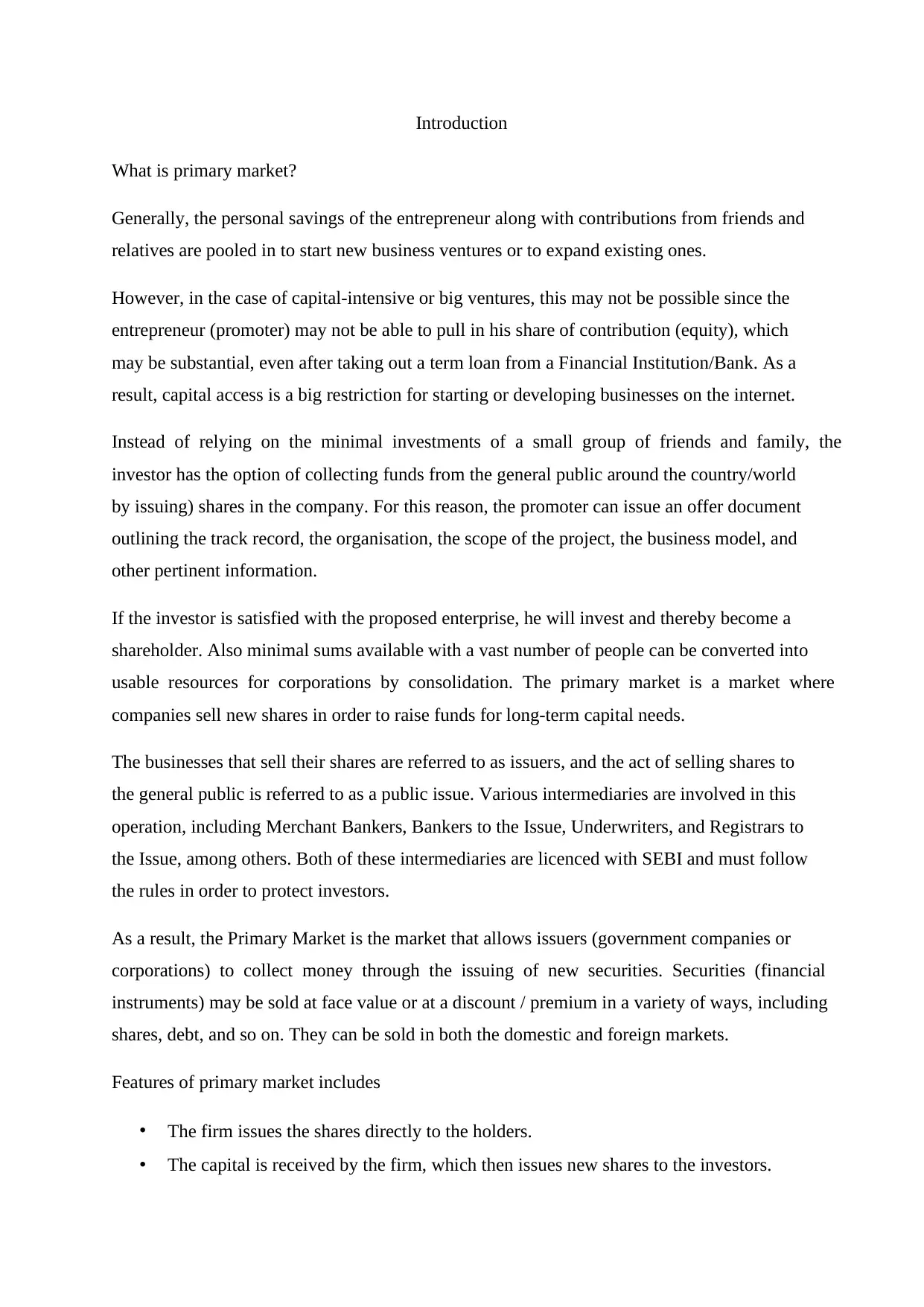
Introduction
What is primary market?
Generally, the personal savings of the entrepreneur along with contributions from friends and
relatives are pooled in to start new business ventures or to expand existing ones.
However, in the case of capital-intensive or big ventures, this may not be possible since the
entrepreneur (promoter) may not be able to pull in his share of contribution (equity), which
may be substantial, even after taking out a term loan from a Financial Institution/Bank. As a
result, capital access is a big restriction for starting or developing businesses on the internet.
Instead of relying on the minimal investments of a small group of friends and family, the
investor has the option of collecting funds from the general public around the country/world
by issuing) shares in the company. For this reason, the promoter can issue an offer document
outlining the track record, the organisation, the scope of the project, the business model, and
other pertinent information.
If the investor is satisfied with the proposed enterprise, he will invest and thereby become a
shareholder. Also minimal sums available with a vast number of people can be converted into
usable resources for corporations by consolidation. The primary market is a market where
companies sell new shares in order to raise funds for long-term capital needs.
The businesses that sell their shares are referred to as issuers, and the act of selling shares to
the general public is referred to as a public issue. Various intermediaries are involved in this
operation, including Merchant Bankers, Bankers to the Issue, Underwriters, and Registrars to
the Issue, among others. Both of these intermediaries are licenced with SEBI and must follow
the rules in order to protect investors.
As a result, the Primary Market is the market that allows issuers (government companies or
corporations) to collect money through the issuing of new securities. Securities (financial
instruments) may be sold at face value or at a discount / premium in a variety of ways, including
shares, debt, and so on. They can be sold in both the domestic and foreign markets.
Features of primary market includes
• The firm issues the shares directly to the holders.
• The capital is received by the firm, which then issues new shares to the investors.
What is primary market?
Generally, the personal savings of the entrepreneur along with contributions from friends and
relatives are pooled in to start new business ventures or to expand existing ones.
However, in the case of capital-intensive or big ventures, this may not be possible since the
entrepreneur (promoter) may not be able to pull in his share of contribution (equity), which
may be substantial, even after taking out a term loan from a Financial Institution/Bank. As a
result, capital access is a big restriction for starting or developing businesses on the internet.
Instead of relying on the minimal investments of a small group of friends and family, the
investor has the option of collecting funds from the general public around the country/world
by issuing) shares in the company. For this reason, the promoter can issue an offer document
outlining the track record, the organisation, the scope of the project, the business model, and
other pertinent information.
If the investor is satisfied with the proposed enterprise, he will invest and thereby become a
shareholder. Also minimal sums available with a vast number of people can be converted into
usable resources for corporations by consolidation. The primary market is a market where
companies sell new shares in order to raise funds for long-term capital needs.
The businesses that sell their shares are referred to as issuers, and the act of selling shares to
the general public is referred to as a public issue. Various intermediaries are involved in this
operation, including Merchant Bankers, Bankers to the Issue, Underwriters, and Registrars to
the Issue, among others. Both of these intermediaries are licenced with SEBI and must follow
the rules in order to protect investors.
As a result, the Primary Market is the market that allows issuers (government companies or
corporations) to collect money through the issuing of new securities. Securities (financial
instruments) may be sold at face value or at a discount / premium in a variety of ways, including
shares, debt, and so on. They can be sold in both the domestic and foreign markets.
Features of primary market includes
• The firm issues the shares directly to the holders.
• The capital is received by the firm, which then issues new shares to the investors.
Paraphrase This Document
Need a fresh take? Get an instant paraphrase of this document with our AI Paraphraser
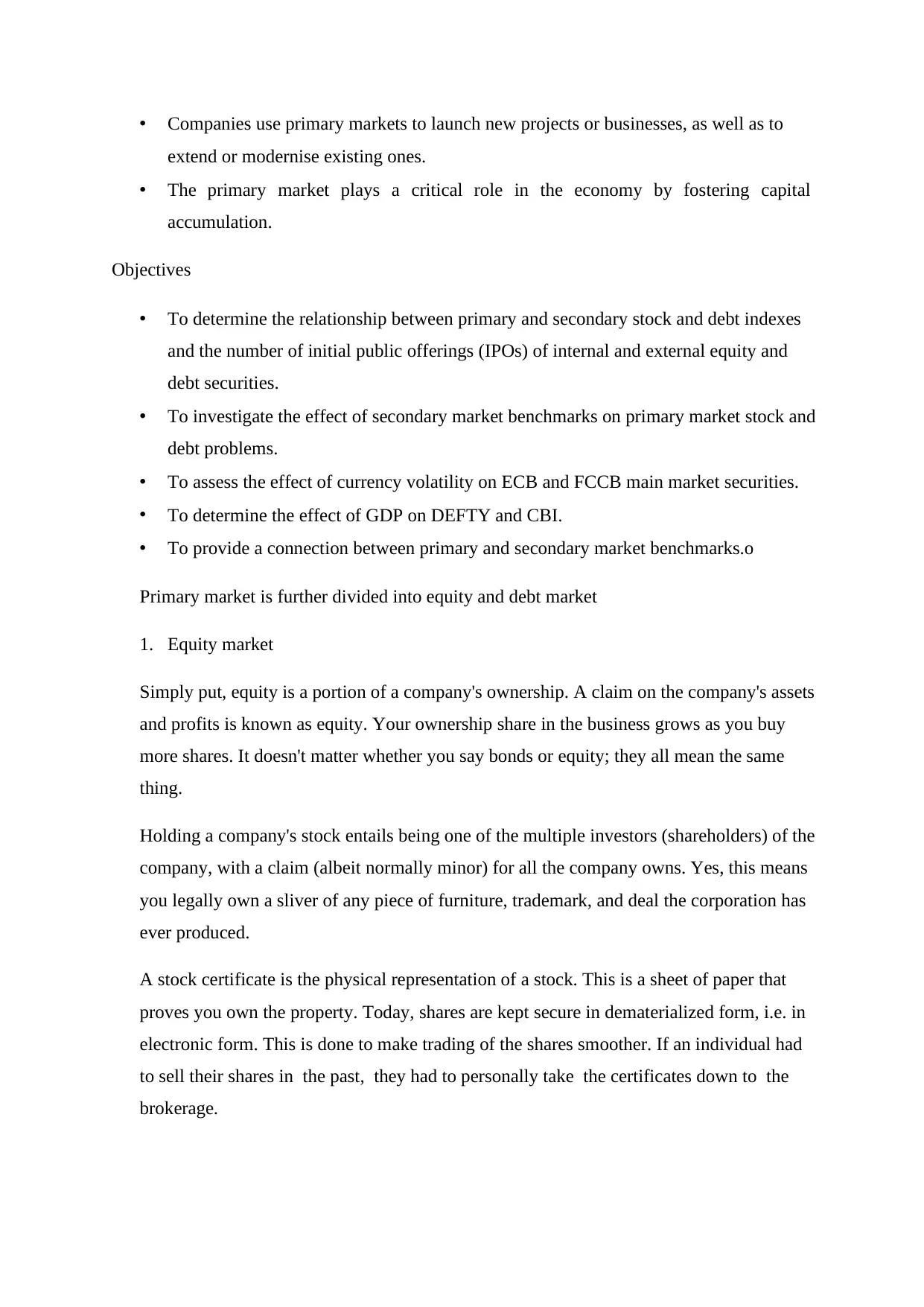
• Companies use primary markets to launch new projects or businesses, as well as to
extend or modernise existing ones.
• The primary market plays a critical role in the economy by fostering capital
accumulation.
Objectives
• To determine the relationship between primary and secondary stock and debt indexes
and the number of initial public offerings (IPOs) of internal and external equity and
debt securities.
• To investigate the effect of secondary market benchmarks on primary market stock and
debt problems.
• To assess the effect of currency volatility on ECB and FCCB main market securities.
• To determine the effect of GDP on DEFTY and CBI.
• To provide a connection between primary and secondary market benchmarks.o
Primary market is further divided into equity and debt market
1. Equity market
Simply put, equity is a portion of a company's ownership. A claim on the company's assets
and profits is known as equity. Your ownership share in the business grows as you buy
more shares. It doesn't matter whether you say bonds or equity; they all mean the same
thing.
Holding a company's stock entails being one of the multiple investors (shareholders) of the
company, with a claim (albeit normally minor) for all the company owns. Yes, this means
you legally own a sliver of any piece of furniture, trademark, and deal the corporation has
ever produced.
A stock certificate is the physical representation of a stock. This is a sheet of paper that
proves you own the property. Today, shares are kept secure in dematerialized form, i.e. in
electronic form. This is done to make trading of the shares smoother. If an individual had
to sell their shares in the past, they had to personally take the certificates down to the
brokerage.
extend or modernise existing ones.
• The primary market plays a critical role in the economy by fostering capital
accumulation.
Objectives
• To determine the relationship between primary and secondary stock and debt indexes
and the number of initial public offerings (IPOs) of internal and external equity and
debt securities.
• To investigate the effect of secondary market benchmarks on primary market stock and
debt problems.
• To assess the effect of currency volatility on ECB and FCCB main market securities.
• To determine the effect of GDP on DEFTY and CBI.
• To provide a connection between primary and secondary market benchmarks.o
Primary market is further divided into equity and debt market
1. Equity market
Simply put, equity is a portion of a company's ownership. A claim on the company's assets
and profits is known as equity. Your ownership share in the business grows as you buy
more shares. It doesn't matter whether you say bonds or equity; they all mean the same
thing.
Holding a company's stock entails being one of the multiple investors (shareholders) of the
company, with a claim (albeit normally minor) for all the company owns. Yes, this means
you legally own a sliver of any piece of furniture, trademark, and deal the corporation has
ever produced.
A stock certificate is the physical representation of a stock. This is a sheet of paper that
proves you own the property. Today, shares are kept secure in dematerialized form, i.e. in
electronic form. This is done to make trading of the shares smoother. If an individual had
to sell their shares in the past, they had to personally take the certificates down to the
brokerage.
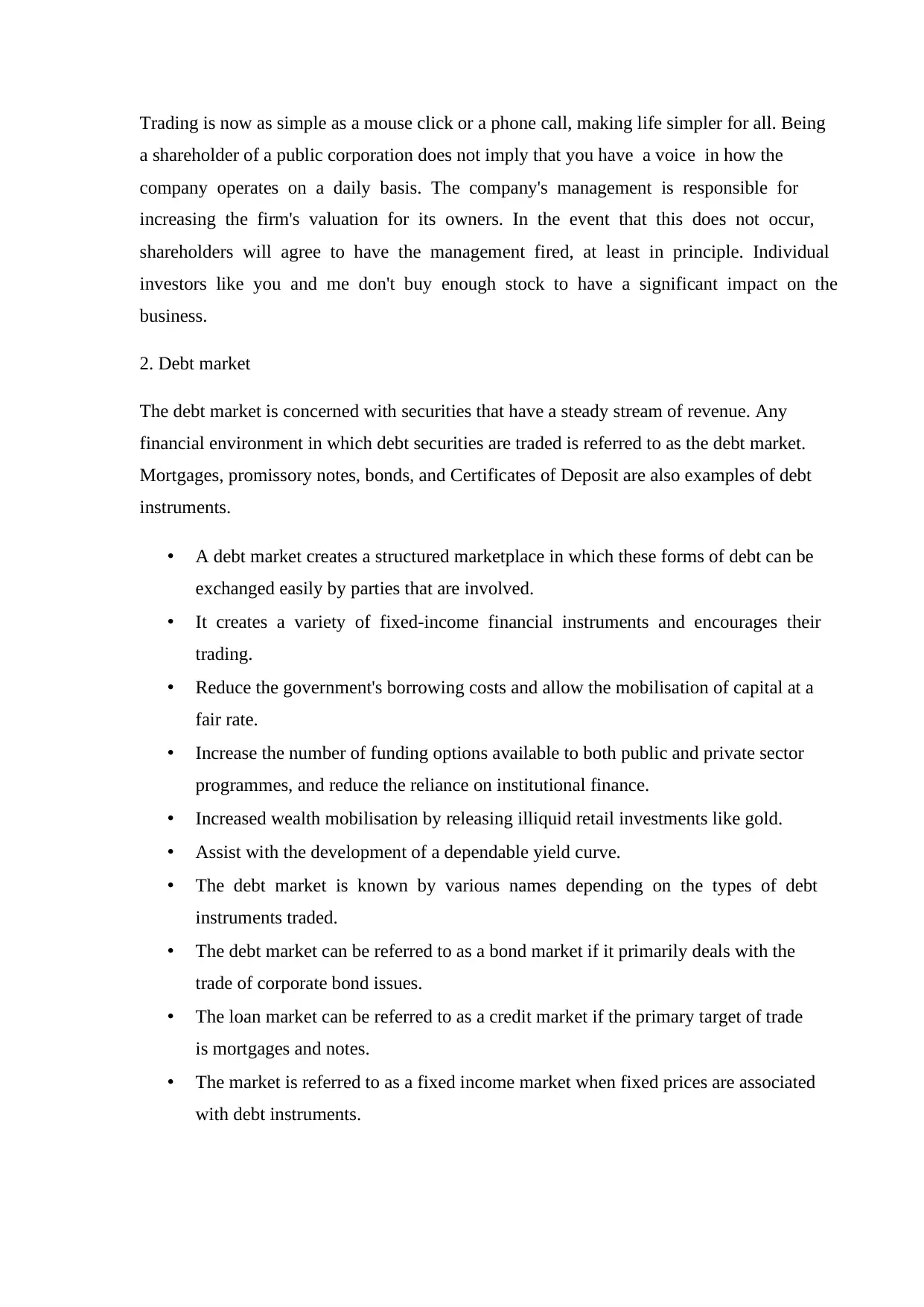
Trading is now as simple as a mouse click or a phone call, making life simpler for all. Being
a shareholder of a public corporation does not imply that you have a voice in how the
company operates on a daily basis. The company's management is responsible for
increasing the firm's valuation for its owners. In the event that this does not occur,
shareholders will agree to have the management fired, at least in principle. Individual
investors like you and me don't buy enough stock to have a significant impact on the
business.
2. Debt market
The debt market is concerned with securities that have a steady stream of revenue. Any
financial environment in which debt securities are traded is referred to as the debt market.
Mortgages, promissory notes, bonds, and Certificates of Deposit are also examples of debt
instruments.
• A debt market creates a structured marketplace in which these forms of debt can be
exchanged easily by parties that are involved.
• It creates a variety of fixed-income financial instruments and encourages their
trading.
• Reduce the government's borrowing costs and allow the mobilisation of capital at a
fair rate.
• Increase the number of funding options available to both public and private sector
programmes, and reduce the reliance on institutional finance.
• Increased wealth mobilisation by releasing illiquid retail investments like gold.
• Assist with the development of a dependable yield curve.
• The debt market is known by various names depending on the types of debt
instruments traded.
• The debt market can be referred to as a bond market if it primarily deals with the
trade of corporate bond issues.
• The loan market can be referred to as a credit market if the primary target of trade
is mortgages and notes.
• The market is referred to as a fixed income market when fixed prices are associated
with debt instruments.
a shareholder of a public corporation does not imply that you have a voice in how the
company operates on a daily basis. The company's management is responsible for
increasing the firm's valuation for its owners. In the event that this does not occur,
shareholders will agree to have the management fired, at least in principle. Individual
investors like you and me don't buy enough stock to have a significant impact on the
business.
2. Debt market
The debt market is concerned with securities that have a steady stream of revenue. Any
financial environment in which debt securities are traded is referred to as the debt market.
Mortgages, promissory notes, bonds, and Certificates of Deposit are also examples of debt
instruments.
• A debt market creates a structured marketplace in which these forms of debt can be
exchanged easily by parties that are involved.
• It creates a variety of fixed-income financial instruments and encourages their
trading.
• Reduce the government's borrowing costs and allow the mobilisation of capital at a
fair rate.
• Increase the number of funding options available to both public and private sector
programmes, and reduce the reliance on institutional finance.
• Increased wealth mobilisation by releasing illiquid retail investments like gold.
• Assist with the development of a dependable yield curve.
• The debt market is known by various names depending on the types of debt
instruments traded.
• The debt market can be referred to as a bond market if it primarily deals with the
trade of corporate bond issues.
• The loan market can be referred to as a credit market if the primary target of trade
is mortgages and notes.
• The market is referred to as a fixed income market when fixed prices are associated
with debt instruments.
⊘ This is a preview!⊘
Do you want full access?
Subscribe today to unlock all pages.

Trusted by 1+ million students worldwide
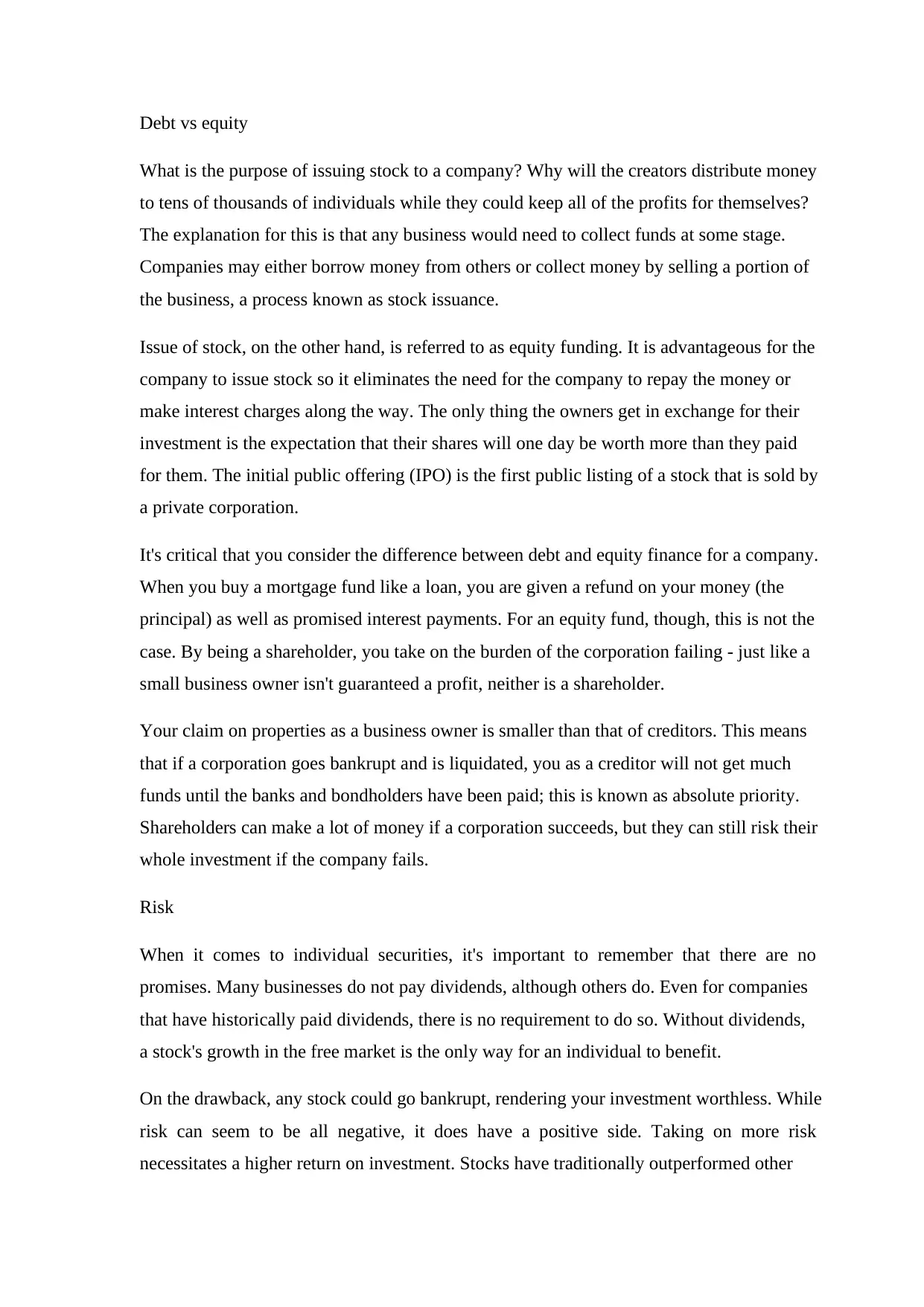
Debt vs equity
What is the purpose of issuing stock to a company? Why will the creators distribute money
to tens of thousands of individuals while they could keep all of the profits for themselves?
The explanation for this is that any business would need to collect funds at some stage.
Companies may either borrow money from others or collect money by selling a portion of
the business, a process known as stock issuance.
Issue of stock, on the other hand, is referred to as equity funding. It is advantageous for the
company to issue stock so it eliminates the need for the company to repay the money or
make interest charges along the way. The only thing the owners get in exchange for their
investment is the expectation that their shares will one day be worth more than they paid
for them. The initial public offering (IPO) is the first public listing of a stock that is sold by
a private corporation.
It's critical that you consider the difference between debt and equity finance for a company.
When you buy a mortgage fund like a loan, you are given a refund on your money (the
principal) as well as promised interest payments. For an equity fund, though, this is not the
case. By being a shareholder, you take on the burden of the corporation failing - just like a
small business owner isn't guaranteed a profit, neither is a shareholder.
Your claim on properties as a business owner is smaller than that of creditors. This means
that if a corporation goes bankrupt and is liquidated, you as a creditor will not get much
funds until the banks and bondholders have been paid; this is known as absolute priority.
Shareholders can make a lot of money if a corporation succeeds, but they can still risk their
whole investment if the company fails.
Risk
When it comes to individual securities, it's important to remember that there are no
promises. Many businesses do not pay dividends, although others do. Even for companies
that have historically paid dividends, there is no requirement to do so. Without dividends,
a stock's growth in the free market is the only way for an individual to benefit.
On the drawback, any stock could go bankrupt, rendering your investment worthless. While
risk can seem to be all negative, it does have a positive side. Taking on more risk
necessitates a higher return on investment. Stocks have traditionally outperformed other
What is the purpose of issuing stock to a company? Why will the creators distribute money
to tens of thousands of individuals while they could keep all of the profits for themselves?
The explanation for this is that any business would need to collect funds at some stage.
Companies may either borrow money from others or collect money by selling a portion of
the business, a process known as stock issuance.
Issue of stock, on the other hand, is referred to as equity funding. It is advantageous for the
company to issue stock so it eliminates the need for the company to repay the money or
make interest charges along the way. The only thing the owners get in exchange for their
investment is the expectation that their shares will one day be worth more than they paid
for them. The initial public offering (IPO) is the first public listing of a stock that is sold by
a private corporation.
It's critical that you consider the difference between debt and equity finance for a company.
When you buy a mortgage fund like a loan, you are given a refund on your money (the
principal) as well as promised interest payments. For an equity fund, though, this is not the
case. By being a shareholder, you take on the burden of the corporation failing - just like a
small business owner isn't guaranteed a profit, neither is a shareholder.
Your claim on properties as a business owner is smaller than that of creditors. This means
that if a corporation goes bankrupt and is liquidated, you as a creditor will not get much
funds until the banks and bondholders have been paid; this is known as absolute priority.
Shareholders can make a lot of money if a corporation succeeds, but they can still risk their
whole investment if the company fails.
Risk
When it comes to individual securities, it's important to remember that there are no
promises. Many businesses do not pay dividends, although others do. Even for companies
that have historically paid dividends, there is no requirement to do so. Without dividends,
a stock's growth in the free market is the only way for an individual to benefit.
On the drawback, any stock could go bankrupt, rendering your investment worthless. While
risk can seem to be all negative, it does have a positive side. Taking on more risk
necessitates a higher return on investment. Stocks have traditionally outperformed other
Paraphrase This Document
Need a fresh take? Get an instant paraphrase of this document with our AI Paraphraser

portfolios such as shares and savings deposits because of this. Stocks have traditionally
provided a 10-12 percent annual return on investment over the long term.
provided a 10-12 percent annual return on investment over the long term.
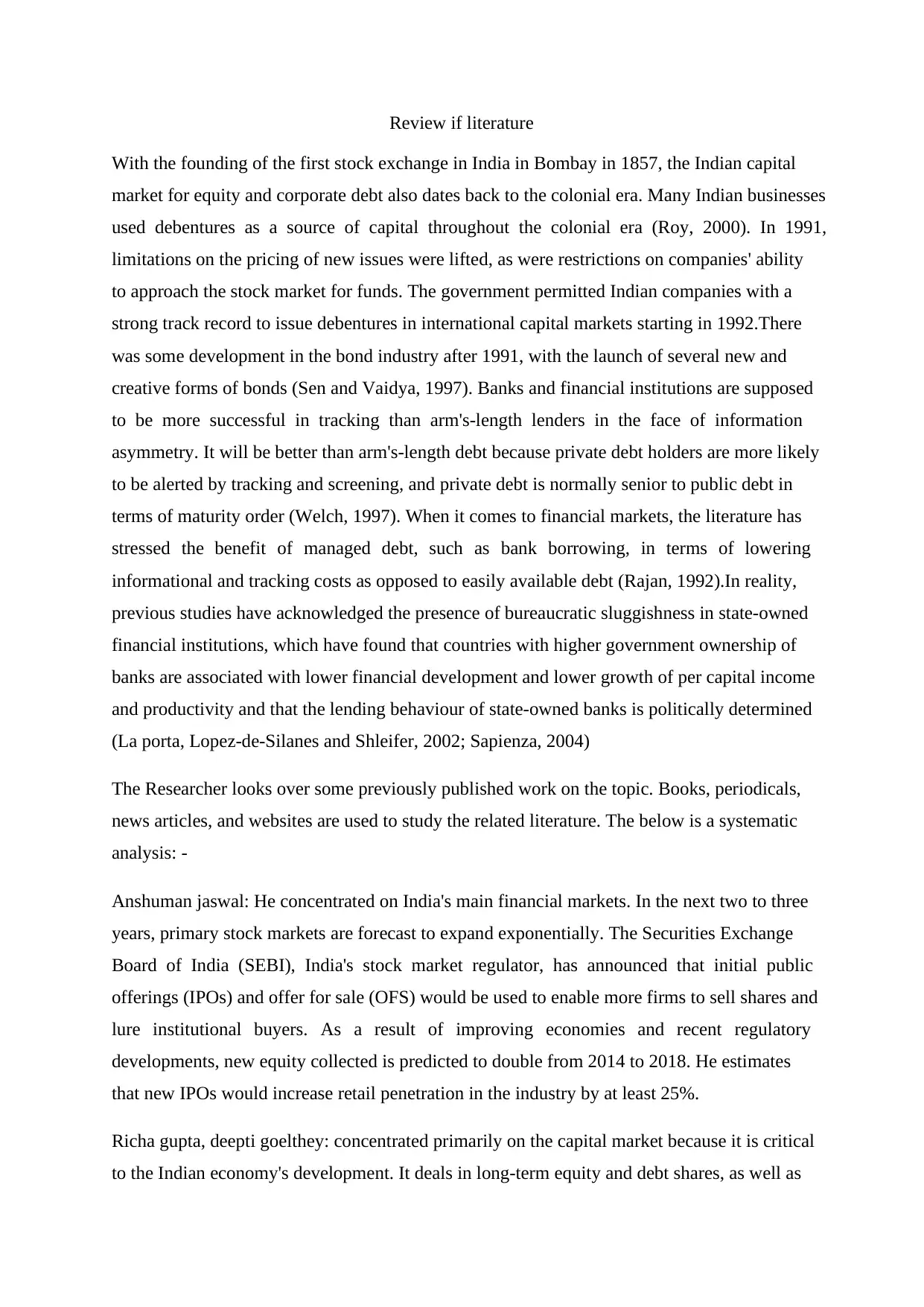
Review if literature
With the founding of the first stock exchange in India in Bombay in 1857, the Indian capital
market for equity and corporate debt also dates back to the colonial era. Many Indian businesses
used debentures as a source of capital throughout the colonial era (Roy, 2000). In 1991,
limitations on the pricing of new issues were lifted, as were restrictions on companies' ability
to approach the stock market for funds. The government permitted Indian companies with a
strong track record to issue debentures in international capital markets starting in 1992.There
was some development in the bond industry after 1991, with the launch of several new and
creative forms of bonds (Sen and Vaidya, 1997). Banks and financial institutions are supposed
to be more successful in tracking than arm's-length lenders in the face of information
asymmetry. It will be better than arm's-length debt because private debt holders are more likely
to be alerted by tracking and screening, and private debt is normally senior to public debt in
terms of maturity order (Welch, 1997). When it comes to financial markets, the literature has
stressed the benefit of managed debt, such as bank borrowing, in terms of lowering
informational and tracking costs as opposed to easily available debt (Rajan, 1992).In reality,
previous studies have acknowledged the presence of bureaucratic sluggishness in state-owned
financial institutions, which have found that countries with higher government ownership of
banks are associated with lower financial development and lower growth of per capital income
and productivity and that the lending behaviour of state-owned banks is politically determined
(La porta, Lopez-de-Silanes and Shleifer, 2002; Sapienza, 2004)
The Researcher looks over some previously published work on the topic. Books, periodicals,
news articles, and websites are used to study the related literature. The below is a systematic
analysis: -
Anshuman jaswal: He concentrated on India's main financial markets. In the next two to three
years, primary stock markets are forecast to expand exponentially. The Securities Exchange
Board of India (SEBI), India's stock market regulator, has announced that initial public
offerings (IPOs) and offer for sale (OFS) would be used to enable more firms to sell shares and
lure institutional buyers. As a result of improving economies and recent regulatory
developments, new equity collected is predicted to double from 2014 to 2018. He estimates
that new IPOs would increase retail penetration in the industry by at least 25%.
Richa gupta, deepti goelthey: concentrated primarily on the capital market because it is critical
to the Indian economy's development. It deals in long-term equity and debt shares, as well as
With the founding of the first stock exchange in India in Bombay in 1857, the Indian capital
market for equity and corporate debt also dates back to the colonial era. Many Indian businesses
used debentures as a source of capital throughout the colonial era (Roy, 2000). In 1991,
limitations on the pricing of new issues were lifted, as were restrictions on companies' ability
to approach the stock market for funds. The government permitted Indian companies with a
strong track record to issue debentures in international capital markets starting in 1992.There
was some development in the bond industry after 1991, with the launch of several new and
creative forms of bonds (Sen and Vaidya, 1997). Banks and financial institutions are supposed
to be more successful in tracking than arm's-length lenders in the face of information
asymmetry. It will be better than arm's-length debt because private debt holders are more likely
to be alerted by tracking and screening, and private debt is normally senior to public debt in
terms of maturity order (Welch, 1997). When it comes to financial markets, the literature has
stressed the benefit of managed debt, such as bank borrowing, in terms of lowering
informational and tracking costs as opposed to easily available debt (Rajan, 1992).In reality,
previous studies have acknowledged the presence of bureaucratic sluggishness in state-owned
financial institutions, which have found that countries with higher government ownership of
banks are associated with lower financial development and lower growth of per capital income
and productivity and that the lending behaviour of state-owned banks is politically determined
(La porta, Lopez-de-Silanes and Shleifer, 2002; Sapienza, 2004)
The Researcher looks over some previously published work on the topic. Books, periodicals,
news articles, and websites are used to study the related literature. The below is a systematic
analysis: -
Anshuman jaswal: He concentrated on India's main financial markets. In the next two to three
years, primary stock markets are forecast to expand exponentially. The Securities Exchange
Board of India (SEBI), India's stock market regulator, has announced that initial public
offerings (IPOs) and offer for sale (OFS) would be used to enable more firms to sell shares and
lure institutional buyers. As a result of improving economies and recent regulatory
developments, new equity collected is predicted to double from 2014 to 2018. He estimates
that new IPOs would increase retail penetration in the industry by at least 25%.
Richa gupta, deepti goelthey: concentrated primarily on the capital market because it is critical
to the Indian economy's development. It deals in long-term equity and debt shares, as well as
⊘ This is a preview!⊘
Do you want full access?
Subscribe today to unlock all pages.

Trusted by 1+ million students worldwide
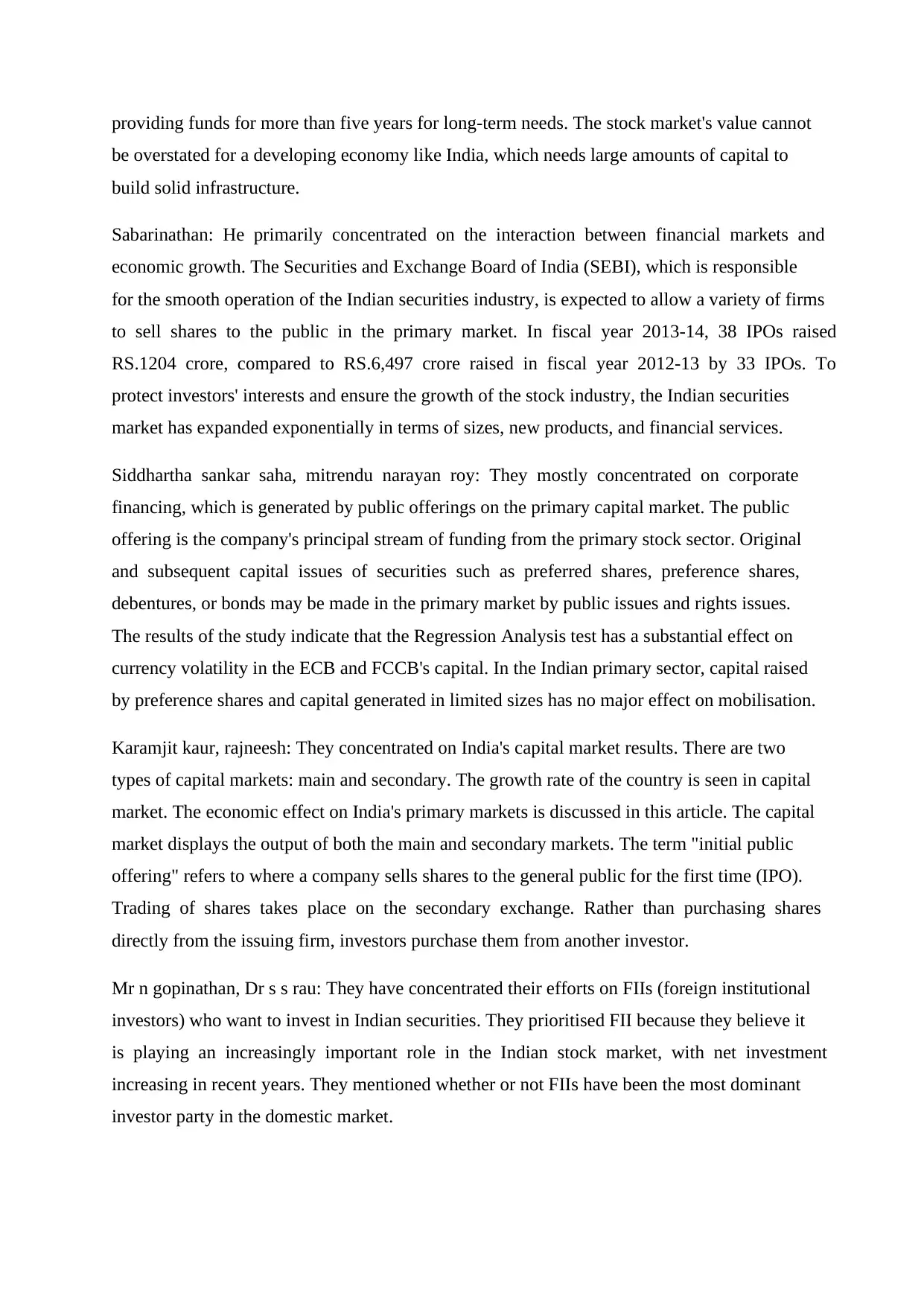
providing funds for more than five years for long-term needs. The stock market's value cannot
be overstated for a developing economy like India, which needs large amounts of capital to
build solid infrastructure.
Sabarinathan: He primarily concentrated on the interaction between financial markets and
economic growth. The Securities and Exchange Board of India (SEBI), which is responsible
for the smooth operation of the Indian securities industry, is expected to allow a variety of firms
to sell shares to the public in the primary market. In fiscal year 2013-14, 38 IPOs raised
RS.1204 crore, compared to RS.6,497 crore raised in fiscal year 2012-13 by 33 IPOs. To
protect investors' interests and ensure the growth of the stock industry, the Indian securities
market has expanded exponentially in terms of sizes, new products, and financial services.
Siddhartha sankar saha, mitrendu narayan roy: They mostly concentrated on corporate
financing, which is generated by public offerings on the primary capital market. The public
offering is the company's principal stream of funding from the primary stock sector. Original
and subsequent capital issues of securities such as preferred shares, preference shares,
debentures, or bonds may be made in the primary market by public issues and rights issues.
The results of the study indicate that the Regression Analysis test has a substantial effect on
currency volatility in the ECB and FCCB's capital. In the Indian primary sector, capital raised
by preference shares and capital generated in limited sizes has no major effect on mobilisation.
Karamjit kaur, rajneesh: They concentrated on India's capital market results. There are two
types of capital markets: main and secondary. The growth rate of the country is seen in capital
market. The economic effect on India's primary markets is discussed in this article. The capital
market displays the output of both the main and secondary markets. The term "initial public
offering" refers to where a company sells shares to the general public for the first time (IPO).
Trading of shares takes place on the secondary exchange. Rather than purchasing shares
directly from the issuing firm, investors purchase them from another investor.
Mr n gopinathan, Dr s s rau: They have concentrated their efforts on FIIs (foreign institutional
investors) who want to invest in Indian securities. They prioritised FII because they believe it
is playing an increasingly important role in the Indian stock market, with net investment
increasing in recent years. They mentioned whether or not FIIs have been the most dominant
investor party in the domestic market.
be overstated for a developing economy like India, which needs large amounts of capital to
build solid infrastructure.
Sabarinathan: He primarily concentrated on the interaction between financial markets and
economic growth. The Securities and Exchange Board of India (SEBI), which is responsible
for the smooth operation of the Indian securities industry, is expected to allow a variety of firms
to sell shares to the public in the primary market. In fiscal year 2013-14, 38 IPOs raised
RS.1204 crore, compared to RS.6,497 crore raised in fiscal year 2012-13 by 33 IPOs. To
protect investors' interests and ensure the growth of the stock industry, the Indian securities
market has expanded exponentially in terms of sizes, new products, and financial services.
Siddhartha sankar saha, mitrendu narayan roy: They mostly concentrated on corporate
financing, which is generated by public offerings on the primary capital market. The public
offering is the company's principal stream of funding from the primary stock sector. Original
and subsequent capital issues of securities such as preferred shares, preference shares,
debentures, or bonds may be made in the primary market by public issues and rights issues.
The results of the study indicate that the Regression Analysis test has a substantial effect on
currency volatility in the ECB and FCCB's capital. In the Indian primary sector, capital raised
by preference shares and capital generated in limited sizes has no major effect on mobilisation.
Karamjit kaur, rajneesh: They concentrated on India's capital market results. There are two
types of capital markets: main and secondary. The growth rate of the country is seen in capital
market. The economic effect on India's primary markets is discussed in this article. The capital
market displays the output of both the main and secondary markets. The term "initial public
offering" refers to where a company sells shares to the general public for the first time (IPO).
Trading of shares takes place on the secondary exchange. Rather than purchasing shares
directly from the issuing firm, investors purchase them from another investor.
Mr n gopinathan, Dr s s rau: They have concentrated their efforts on FIIs (foreign institutional
investors) who want to invest in Indian securities. They prioritised FII because they believe it
is playing an increasingly important role in the Indian stock market, with net investment
increasing in recent years. They mentioned whether or not FIIs have been the most dominant
investor party in the domestic market.
Paraphrase This Document
Need a fresh take? Get an instant paraphrase of this document with our AI Paraphraser
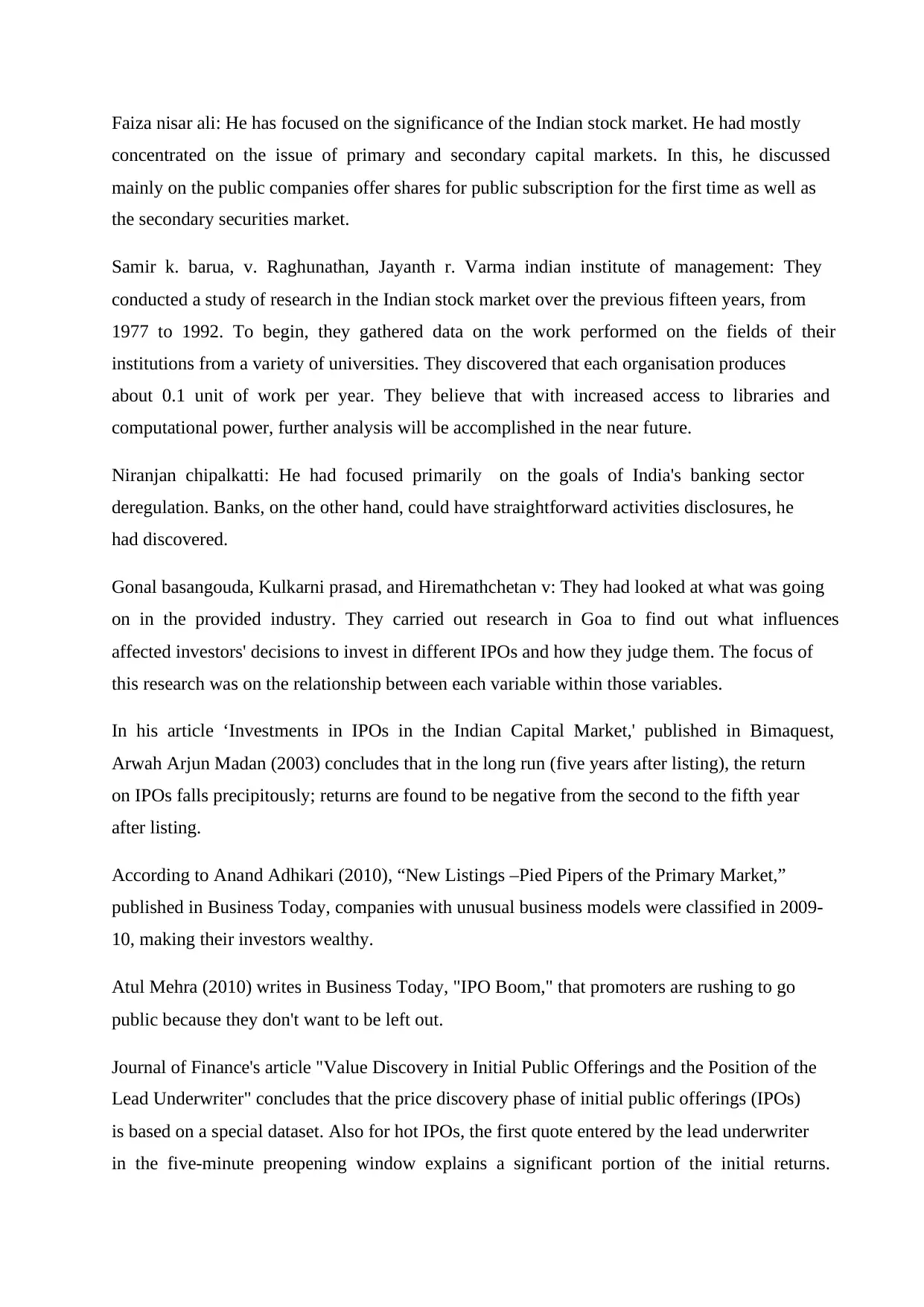
Faiza nisar ali: He has focused on the significance of the Indian stock market. He had mostly
concentrated on the issue of primary and secondary capital markets. In this, he discussed
mainly on the public companies offer shares for public subscription for the first time as well as
the secondary securities market.
Samir k. barua, v. Raghunathan, Jayanth r. Varma indian institute of management: They
conducted a study of research in the Indian stock market over the previous fifteen years, from
1977 to 1992. To begin, they gathered data on the work performed on the fields of their
institutions from a variety of universities. They discovered that each organisation produces
about 0.1 unit of work per year. They believe that with increased access to libraries and
computational power, further analysis will be accomplished in the near future.
Niranjan chipalkatti: He had focused primarily on the goals of India's banking sector
deregulation. Banks, on the other hand, could have straightforward activities disclosures, he
had discovered.
Gonal basangouda, Kulkarni prasad, and Hiremathchetan v: They had looked at what was going
on in the provided industry. They carried out research in Goa to find out what influences
affected investors' decisions to invest in different IPOs and how they judge them. The focus of
this research was on the relationship between each variable within those variables.
In his article ‘Investments in IPOs in the Indian Capital Market,' published in Bimaquest,
Arwah Arjun Madan (2003) concludes that in the long run (five years after listing), the return
on IPOs falls precipitously; returns are found to be negative from the second to the fifth year
after listing.
According to Anand Adhikari (2010), “New Listings –Pied Pipers of the Primary Market,”
published in Business Today, companies with unusual business models were classified in 2009-
10, making their investors wealthy.
Atul Mehra (2010) writes in Business Today, "IPO Boom," that promoters are rushing to go
public because they don't want to be left out.
Journal of Finance's article "Value Discovery in Initial Public Offerings and the Position of the
Lead Underwriter" concludes that the price discovery phase of initial public offerings (IPOs)
is based on a special dataset. Also for hot IPOs, the first quote entered by the lead underwriter
in the five-minute preopening window explains a significant portion of the initial returns.
concentrated on the issue of primary and secondary capital markets. In this, he discussed
mainly on the public companies offer shares for public subscription for the first time as well as
the secondary securities market.
Samir k. barua, v. Raghunathan, Jayanth r. Varma indian institute of management: They
conducted a study of research in the Indian stock market over the previous fifteen years, from
1977 to 1992. To begin, they gathered data on the work performed on the fields of their
institutions from a variety of universities. They discovered that each organisation produces
about 0.1 unit of work per year. They believe that with increased access to libraries and
computational power, further analysis will be accomplished in the near future.
Niranjan chipalkatti: He had focused primarily on the goals of India's banking sector
deregulation. Banks, on the other hand, could have straightforward activities disclosures, he
had discovered.
Gonal basangouda, Kulkarni prasad, and Hiremathchetan v: They had looked at what was going
on in the provided industry. They carried out research in Goa to find out what influences
affected investors' decisions to invest in different IPOs and how they judge them. The focus of
this research was on the relationship between each variable within those variables.
In his article ‘Investments in IPOs in the Indian Capital Market,' published in Bimaquest,
Arwah Arjun Madan (2003) concludes that in the long run (five years after listing), the return
on IPOs falls precipitously; returns are found to be negative from the second to the fifth year
after listing.
According to Anand Adhikari (2010), “New Listings –Pied Pipers of the Primary Market,”
published in Business Today, companies with unusual business models were classified in 2009-
10, making their investors wealthy.
Atul Mehra (2010) writes in Business Today, "IPO Boom," that promoters are rushing to go
public because they don't want to be left out.
Journal of Finance's article "Value Discovery in Initial Public Offerings and the Position of the
Lead Underwriter" concludes that the price discovery phase of initial public offerings (IPOs)
is based on a special dataset. Also for hot IPOs, the first quote entered by the lead underwriter
in the five-minute preopening window explains a significant portion of the initial returns.
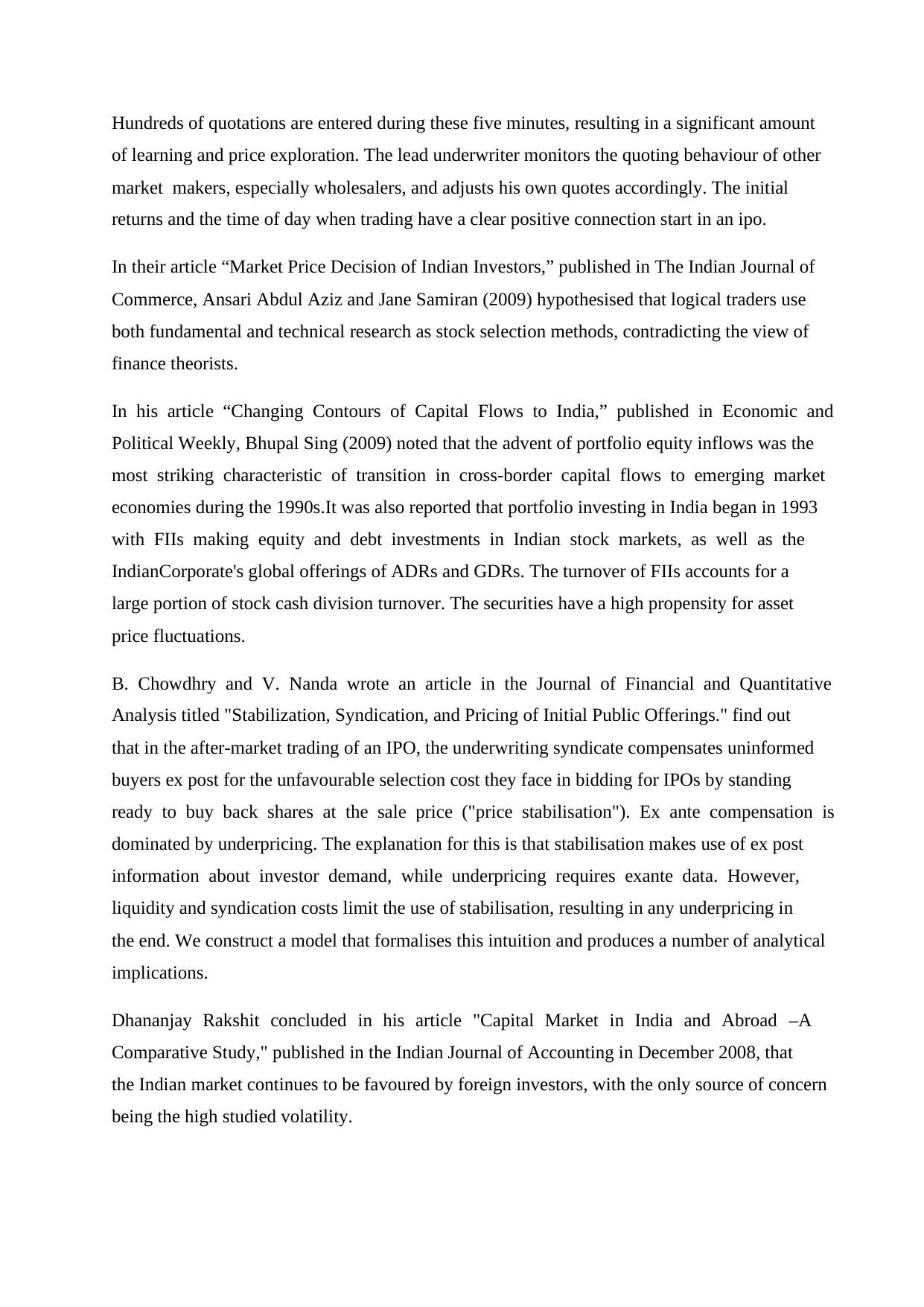
Hundreds of quotations are entered during these five minutes, resulting in a significant amount
of learning and price exploration. The lead underwriter monitors the quoting behaviour of other
market makers, especially wholesalers, and adjusts his own quotes accordingly. The initial
returns and the time of day when trading have a clear positive connection start in an ipo.
In their article “Market Price Decision of Indian Investors,” published in The Indian Journal of
Commerce, Ansari Abdul Aziz and Jane Samiran (2009) hypothesised that logical traders use
both fundamental and technical research as stock selection methods, contradicting the view of
finance theorists.
In his article “Changing Contours of Capital Flows to India,” published in Economic and
Political Weekly, Bhupal Sing (2009) noted that the advent of portfolio equity inflows was the
most striking characteristic of transition in cross-border capital flows to emerging market
economies during the 1990s.It was also reported that portfolio investing in India began in 1993
with FIIs making equity and debt investments in Indian stock markets, as well as the
IndianCorporate's global offerings of ADRs and GDRs. The turnover of FIIs accounts for a
large portion of stock cash division turnover. The securities have a high propensity for asset
price fluctuations.
B. Chowdhry and V. Nanda wrote an article in the Journal of Financial and Quantitative
Analysis titled "Stabilization, Syndication, and Pricing of Initial Public Offerings." find out
that in the after-market trading of an IPO, the underwriting syndicate compensates uninformed
buyers ex post for the unfavourable selection cost they face in bidding for IPOs by standing
ready to buy back shares at the sale price ("price stabilisation"). Ex ante compensation is
dominated by underpricing. The explanation for this is that stabilisation makes use of ex post
information about investor demand, while underpricing requires exante data. However,
liquidity and syndication costs limit the use of stabilisation, resulting in any underpricing in
the end. We construct a model that formalises this intuition and produces a number of analytical
implications.
Dhananjay Rakshit concluded in his article "Capital Market in India and Abroad –A
Comparative Study," published in the Indian Journal of Accounting in December 2008, that
the Indian market continues to be favoured by foreign investors, with the only source of concern
being the high studied volatility.
of learning and price exploration. The lead underwriter monitors the quoting behaviour of other
market makers, especially wholesalers, and adjusts his own quotes accordingly. The initial
returns and the time of day when trading have a clear positive connection start in an ipo.
In their article “Market Price Decision of Indian Investors,” published in The Indian Journal of
Commerce, Ansari Abdul Aziz and Jane Samiran (2009) hypothesised that logical traders use
both fundamental and technical research as stock selection methods, contradicting the view of
finance theorists.
In his article “Changing Contours of Capital Flows to India,” published in Economic and
Political Weekly, Bhupal Sing (2009) noted that the advent of portfolio equity inflows was the
most striking characteristic of transition in cross-border capital flows to emerging market
economies during the 1990s.It was also reported that portfolio investing in India began in 1993
with FIIs making equity and debt investments in Indian stock markets, as well as the
IndianCorporate's global offerings of ADRs and GDRs. The turnover of FIIs accounts for a
large portion of stock cash division turnover. The securities have a high propensity for asset
price fluctuations.
B. Chowdhry and V. Nanda wrote an article in the Journal of Financial and Quantitative
Analysis titled "Stabilization, Syndication, and Pricing of Initial Public Offerings." find out
that in the after-market trading of an IPO, the underwriting syndicate compensates uninformed
buyers ex post for the unfavourable selection cost they face in bidding for IPOs by standing
ready to buy back shares at the sale price ("price stabilisation"). Ex ante compensation is
dominated by underpricing. The explanation for this is that stabilisation makes use of ex post
information about investor demand, while underpricing requires exante data. However,
liquidity and syndication costs limit the use of stabilisation, resulting in any underpricing in
the end. We construct a model that formalises this intuition and produces a number of analytical
implications.
Dhananjay Rakshit concluded in his article "Capital Market in India and Abroad –A
Comparative Study," published in the Indian Journal of Accounting in December 2008, that
the Indian market continues to be favoured by foreign investors, with the only source of concern
being the high studied volatility.
⊘ This is a preview!⊘
Do you want full access?
Subscribe today to unlock all pages.

Trusted by 1+ million students worldwide
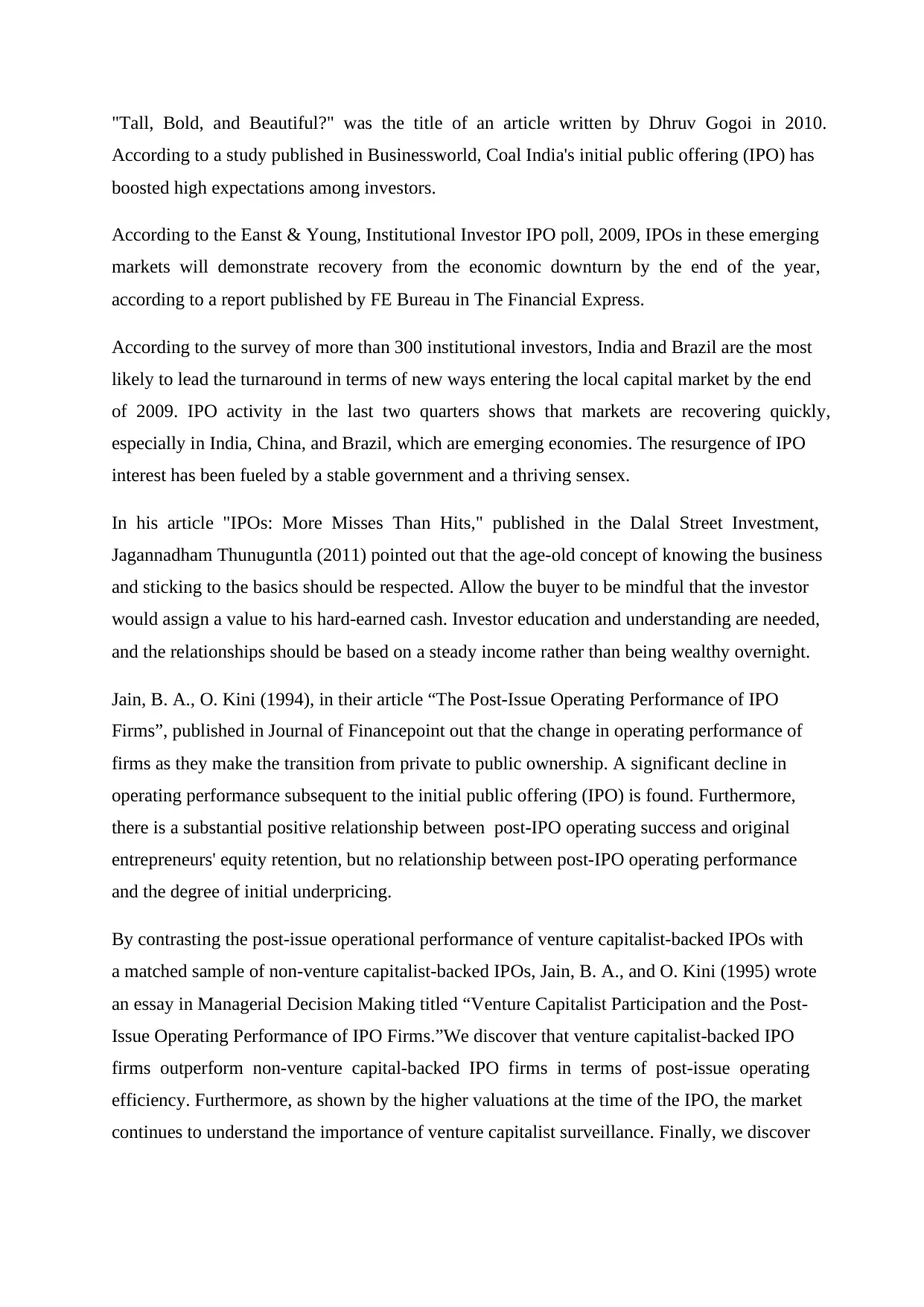
"Tall, Bold, and Beautiful?" was the title of an article written by Dhruv Gogoi in 2010.
According to a study published in Businessworld, Coal India's initial public offering (IPO) has
boosted high expectations among investors.
According to the Eanst & Young, Institutional Investor IPO poll, 2009, IPOs in these emerging
markets will demonstrate recovery from the economic downturn by the end of the year,
according to a report published by FE Bureau in The Financial Express.
According to the survey of more than 300 institutional investors, India and Brazil are the most
likely to lead the turnaround in terms of new ways entering the local capital market by the end
of 2009. IPO activity in the last two quarters shows that markets are recovering quickly,
especially in India, China, and Brazil, which are emerging economies. The resurgence of IPO
interest has been fueled by a stable government and a thriving sensex.
In his article "IPOs: More Misses Than Hits," published in the Dalal Street Investment,
Jagannadham Thunuguntla (2011) pointed out that the age-old concept of knowing the business
and sticking to the basics should be respected. Allow the buyer to be mindful that the investor
would assign a value to his hard-earned cash. Investor education and understanding are needed,
and the relationships should be based on a steady income rather than being wealthy overnight.
Jain, B. A., O. Kini (1994), in their article “The Post-Issue Operating Performance of IPO
Firms”, published in Journal of Financepoint out that the change in operating performance of
firms as they make the transition from private to public ownership. A significant decline in
operating performance subsequent to the initial public offering (IPO) is found. Furthermore,
there is a substantial positive relationship between post-IPO operating success and original
entrepreneurs' equity retention, but no relationship between post-IPO operating performance
and the degree of initial underpricing.
By contrasting the post-issue operational performance of venture capitalist-backed IPOs with
a matched sample of non-venture capitalist-backed IPOs, Jain, B. A., and O. Kini (1995) wrote
an essay in Managerial Decision Making titled “Venture Capitalist Participation and the Post-
Issue Operating Performance of IPO Firms.”We discover that venture capitalist-backed IPO
firms outperform non-venture capital-backed IPO firms in terms of post-issue operating
efficiency. Furthermore, as shown by the higher valuations at the time of the IPO, the market
continues to understand the importance of venture capitalist surveillance. Finally, we discover
According to a study published in Businessworld, Coal India's initial public offering (IPO) has
boosted high expectations among investors.
According to the Eanst & Young, Institutional Investor IPO poll, 2009, IPOs in these emerging
markets will demonstrate recovery from the economic downturn by the end of the year,
according to a report published by FE Bureau in The Financial Express.
According to the survey of more than 300 institutional investors, India and Brazil are the most
likely to lead the turnaround in terms of new ways entering the local capital market by the end
of 2009. IPO activity in the last two quarters shows that markets are recovering quickly,
especially in India, China, and Brazil, which are emerging economies. The resurgence of IPO
interest has been fueled by a stable government and a thriving sensex.
In his article "IPOs: More Misses Than Hits," published in the Dalal Street Investment,
Jagannadham Thunuguntla (2011) pointed out that the age-old concept of knowing the business
and sticking to the basics should be respected. Allow the buyer to be mindful that the investor
would assign a value to his hard-earned cash. Investor education and understanding are needed,
and the relationships should be based on a steady income rather than being wealthy overnight.
Jain, B. A., O. Kini (1994), in their article “The Post-Issue Operating Performance of IPO
Firms”, published in Journal of Financepoint out that the change in operating performance of
firms as they make the transition from private to public ownership. A significant decline in
operating performance subsequent to the initial public offering (IPO) is found. Furthermore,
there is a substantial positive relationship between post-IPO operating success and original
entrepreneurs' equity retention, but no relationship between post-IPO operating performance
and the degree of initial underpricing.
By contrasting the post-issue operational performance of venture capitalist-backed IPOs with
a matched sample of non-venture capitalist-backed IPOs, Jain, B. A., and O. Kini (1995) wrote
an essay in Managerial Decision Making titled “Venture Capitalist Participation and the Post-
Issue Operating Performance of IPO Firms.”We discover that venture capitalist-backed IPO
firms outperform non-venture capital-backed IPO firms in terms of post-issue operating
efficiency. Furthermore, as shown by the higher valuations at the time of the IPO, the market
continues to understand the importance of venture capitalist surveillance. Finally, we discover
Paraphrase This Document
Need a fresh take? Get an instant paraphrase of this document with our AI Paraphraser
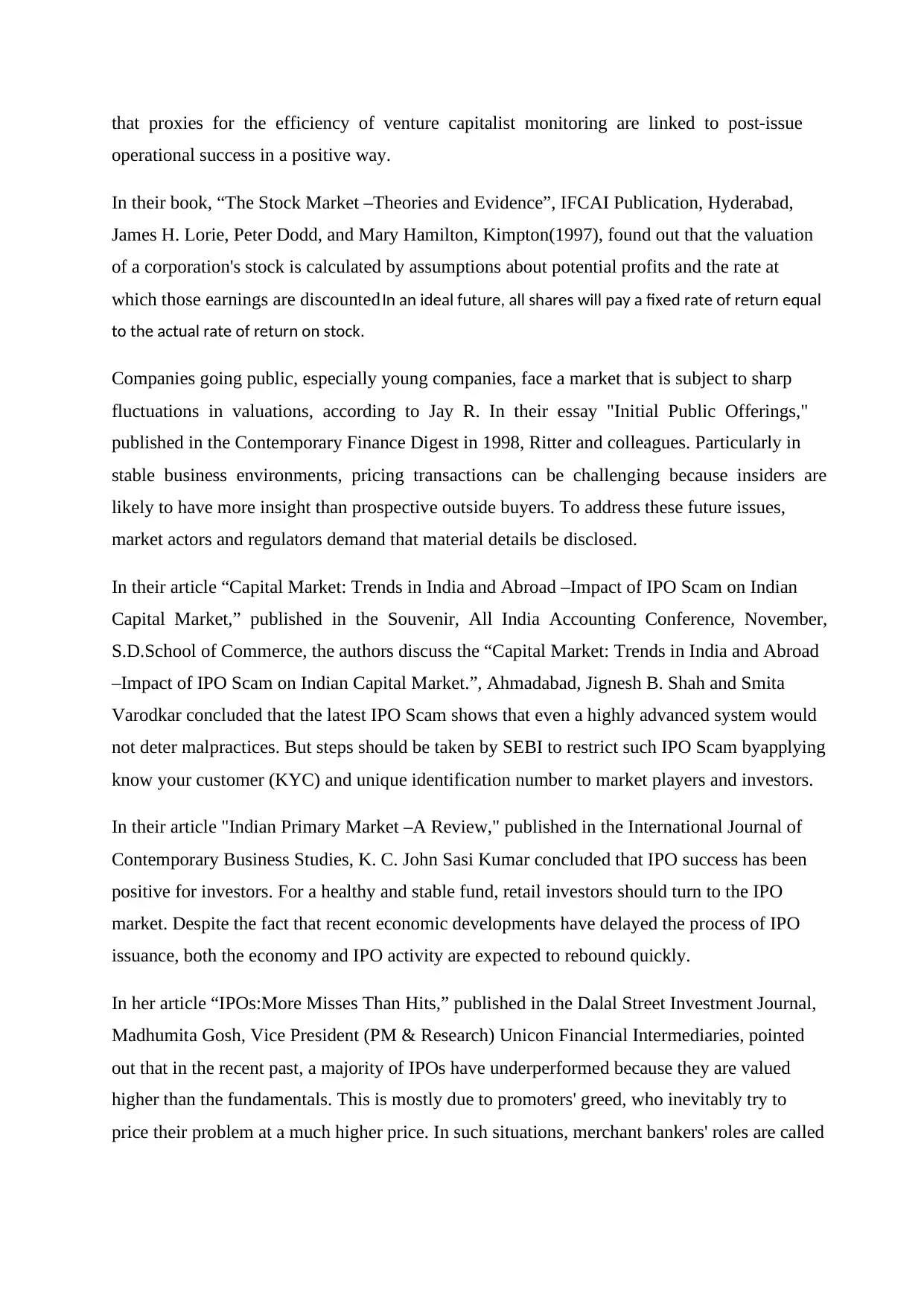
that proxies for the efficiency of venture capitalist monitoring are linked to post-issue
operational success in a positive way.
In their book, “The Stock Market –Theories and Evidence”, IFCAI Publication, Hyderabad,
James H. Lorie, Peter Dodd, and Mary Hamilton, Kimpton(1997), found out that the valuation
of a corporation's stock is calculated by assumptions about potential profits and the rate at
which those earnings are discounted In an ideal future, all shares will pay a fixed rate of return equal
to the actual rate of return on stock.
Companies going public, especially young companies, face a market that is subject to sharp
fluctuations in valuations, according to Jay R. In their essay "Initial Public Offerings,"
published in the Contemporary Finance Digest in 1998, Ritter and colleagues. Particularly in
stable business environments, pricing transactions can be challenging because insiders are
likely to have more insight than prospective outside buyers. To address these future issues,
market actors and regulators demand that material details be disclosed.
In their article “Capital Market: Trends in India and Abroad –Impact of IPO Scam on Indian
Capital Market,” published in the Souvenir, All India Accounting Conference, November,
S.D.School of Commerce, the authors discuss the “Capital Market: Trends in India and Abroad
–Impact of IPO Scam on Indian Capital Market.”, Ahmadabad, Jignesh B. Shah and Smita
Varodkar concluded that the latest IPO Scam shows that even a highly advanced system would
not deter malpractices. But steps should be taken by SEBI to restrict such IPO Scam byapplying
know your customer (KYC) and unique identification number to market players and investors.
In their article "Indian Primary Market –A Review," published in the International Journal of
Contemporary Business Studies, K. C. John Sasi Kumar concluded that IPO success has been
positive for investors. For a healthy and stable fund, retail investors should turn to the IPO
market. Despite the fact that recent economic developments have delayed the process of IPO
issuance, both the economy and IPO activity are expected to rebound quickly.
In her article “IPOs:More Misses Than Hits,” published in the Dalal Street Investment Journal,
Madhumita Gosh, Vice President (PM & Research) Unicon Financial Intermediaries, pointed
out that in the recent past, a majority of IPOs have underperformed because they are valued
higher than the fundamentals. This is mostly due to promoters' greed, who inevitably try to
price their problem at a much higher price. In such situations, merchant bankers' roles are called
operational success in a positive way.
In their book, “The Stock Market –Theories and Evidence”, IFCAI Publication, Hyderabad,
James H. Lorie, Peter Dodd, and Mary Hamilton, Kimpton(1997), found out that the valuation
of a corporation's stock is calculated by assumptions about potential profits and the rate at
which those earnings are discounted In an ideal future, all shares will pay a fixed rate of return equal
to the actual rate of return on stock.
Companies going public, especially young companies, face a market that is subject to sharp
fluctuations in valuations, according to Jay R. In their essay "Initial Public Offerings,"
published in the Contemporary Finance Digest in 1998, Ritter and colleagues. Particularly in
stable business environments, pricing transactions can be challenging because insiders are
likely to have more insight than prospective outside buyers. To address these future issues,
market actors and regulators demand that material details be disclosed.
In their article “Capital Market: Trends in India and Abroad –Impact of IPO Scam on Indian
Capital Market,” published in the Souvenir, All India Accounting Conference, November,
S.D.School of Commerce, the authors discuss the “Capital Market: Trends in India and Abroad
–Impact of IPO Scam on Indian Capital Market.”, Ahmadabad, Jignesh B. Shah and Smita
Varodkar concluded that the latest IPO Scam shows that even a highly advanced system would
not deter malpractices. But steps should be taken by SEBI to restrict such IPO Scam byapplying
know your customer (KYC) and unique identification number to market players and investors.
In their article "Indian Primary Market –A Review," published in the International Journal of
Contemporary Business Studies, K. C. John Sasi Kumar concluded that IPO success has been
positive for investors. For a healthy and stable fund, retail investors should turn to the IPO
market. Despite the fact that recent economic developments have delayed the process of IPO
issuance, both the economy and IPO activity are expected to rebound quickly.
In her article “IPOs:More Misses Than Hits,” published in the Dalal Street Investment Journal,
Madhumita Gosh, Vice President (PM & Research) Unicon Financial Intermediaries, pointed
out that in the recent past, a majority of IPOs have underperformed because they are valued
higher than the fundamentals. This is mostly due to promoters' greed, who inevitably try to
price their problem at a much higher price. In such situations, merchant bankers' roles are called
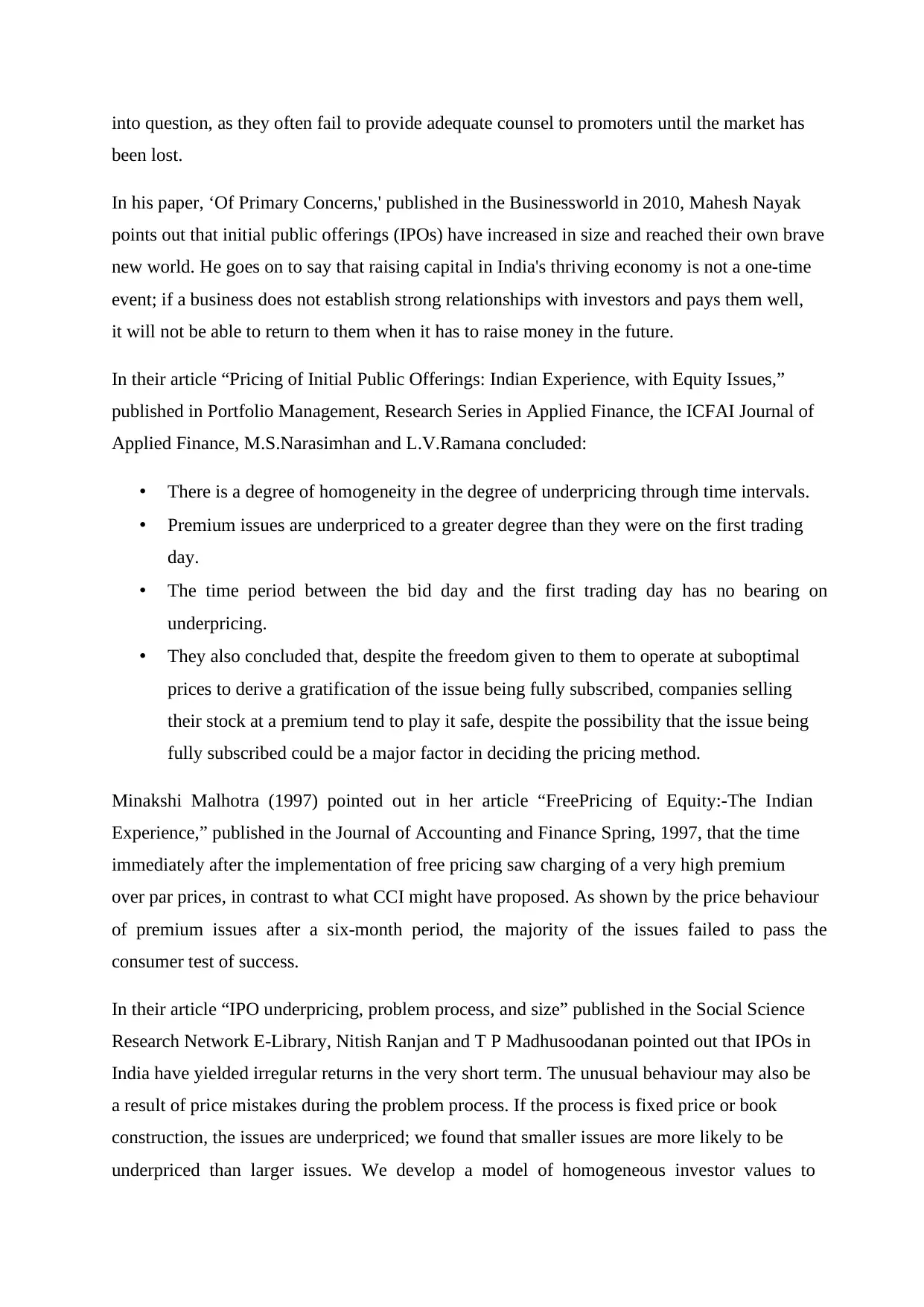
into question, as they often fail to provide adequate counsel to promoters until the market has
been lost.
In his paper, ‘Of Primary Concerns,' published in the Businessworld in 2010, Mahesh Nayak
points out that initial public offerings (IPOs) have increased in size and reached their own brave
new world. He goes on to say that raising capital in India's thriving economy is not a one-time
event; if a business does not establish strong relationships with investors and pays them well,
it will not be able to return to them when it has to raise money in the future.
In their article “Pricing of Initial Public Offerings: Indian Experience, with Equity Issues,”
published in Portfolio Management, Research Series in Applied Finance, the ICFAI Journal of
Applied Finance, M.S.Narasimhan and L.V.Ramana concluded:
• There is a degree of homogeneity in the degree of underpricing through time intervals.
• Premium issues are underpriced to a greater degree than they were on the first trading
day.
• The time period between the bid day and the first trading day has no bearing on
underpricing.
• They also concluded that, despite the freedom given to them to operate at suboptimal
prices to derive a gratification of the issue being fully subscribed, companies selling
their stock at a premium tend to play it safe, despite the possibility that the issue being
fully subscribed could be a major factor in deciding the pricing method.
Minakshi Malhotra (1997) pointed out in her article “FreePricing of Equity:-The Indian
Experience,” published in the Journal of Accounting and Finance Spring, 1997, that the time
immediately after the implementation of free pricing saw charging of a very high premium
over par prices, in contrast to what CCI might have proposed. As shown by the price behaviour
of premium issues after a six-month period, the majority of the issues failed to pass the
consumer test of success.
In their article “IPO underpricing, problem process, and size” published in the Social Science
Research Network E-Library, Nitish Ranjan and T P Madhusoodanan pointed out that IPOs in
India have yielded irregular returns in the very short term. The unusual behaviour may also be
a result of price mistakes during the problem process. If the process is fixed price or book
construction, the issues are underpriced; we found that smaller issues are more likely to be
underpriced than larger issues. We develop a model of homogeneous investor values to
been lost.
In his paper, ‘Of Primary Concerns,' published in the Businessworld in 2010, Mahesh Nayak
points out that initial public offerings (IPOs) have increased in size and reached their own brave
new world. He goes on to say that raising capital in India's thriving economy is not a one-time
event; if a business does not establish strong relationships with investors and pays them well,
it will not be able to return to them when it has to raise money in the future.
In their article “Pricing of Initial Public Offerings: Indian Experience, with Equity Issues,”
published in Portfolio Management, Research Series in Applied Finance, the ICFAI Journal of
Applied Finance, M.S.Narasimhan and L.V.Ramana concluded:
• There is a degree of homogeneity in the degree of underpricing through time intervals.
• Premium issues are underpriced to a greater degree than they were on the first trading
day.
• The time period between the bid day and the first trading day has no bearing on
underpricing.
• They also concluded that, despite the freedom given to them to operate at suboptimal
prices to derive a gratification of the issue being fully subscribed, companies selling
their stock at a premium tend to play it safe, despite the possibility that the issue being
fully subscribed could be a major factor in deciding the pricing method.
Minakshi Malhotra (1997) pointed out in her article “FreePricing of Equity:-The Indian
Experience,” published in the Journal of Accounting and Finance Spring, 1997, that the time
immediately after the implementation of free pricing saw charging of a very high premium
over par prices, in contrast to what CCI might have proposed. As shown by the price behaviour
of premium issues after a six-month period, the majority of the issues failed to pass the
consumer test of success.
In their article “IPO underpricing, problem process, and size” published in the Social Science
Research Network E-Library, Nitish Ranjan and T P Madhusoodanan pointed out that IPOs in
India have yielded irregular returns in the very short term. The unusual behaviour may also be
a result of price mistakes during the problem process. If the process is fixed price or book
construction, the issues are underpriced; we found that smaller issues are more likely to be
underpriced than larger issues. We develop a model of homogeneous investor values to
⊘ This is a preview!⊘
Do you want full access?
Subscribe today to unlock all pages.

Trusted by 1+ million students worldwide
1 out of 12
Related Documents
Your All-in-One AI-Powered Toolkit for Academic Success.
+13062052269
info@desklib.com
Available 24*7 on WhatsApp / Email
![[object Object]](/_next/static/media/star-bottom.7253800d.svg)
Unlock your academic potential
© 2024 | Zucol Services PVT LTD | All rights reserved.




